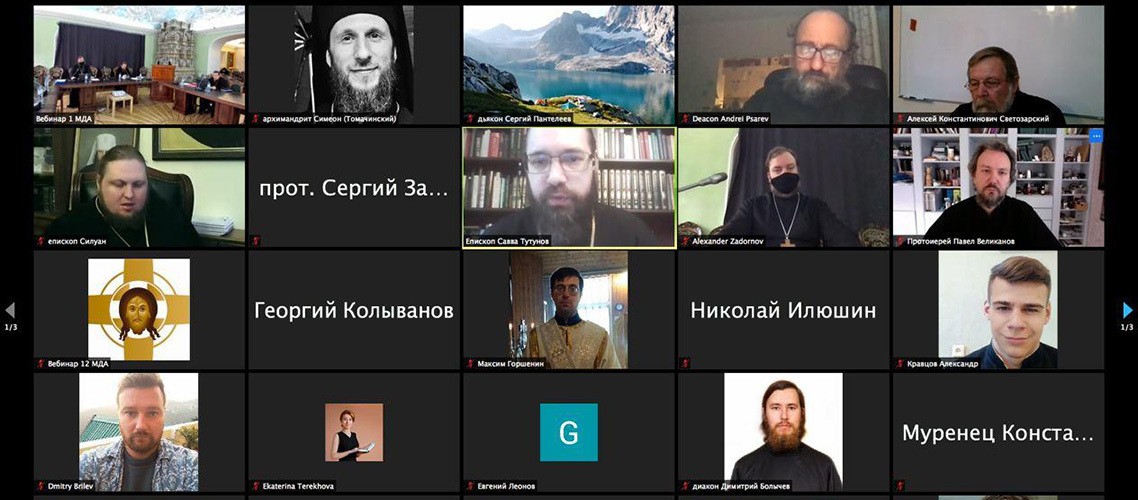
Sectional meetings of the annual National Intercession Conference
On October 16, within the framework of the All-Russian National Intercession Scientific Conference the Moscow Theological Academy organised a round table on "Persecuted Christians in the context of protecting human rights".
The event got a financial support of the Russian Foundation for Basic Research within the framework of scientific project No. 18-011-00292. The number of participants included about 40 scientists, graduate students, representatives of various universities both from Russia and foreign countries. The main aim of the round table was to some crucial topics related to persecution and discrimination of the Christians. Despite the existing international legal mechanisms to protect the right to freedom of conscience, thought and religion, the speakers mentioned serious violations of the Christians’ rights in the Middle East, Pakistan and Western Europe.
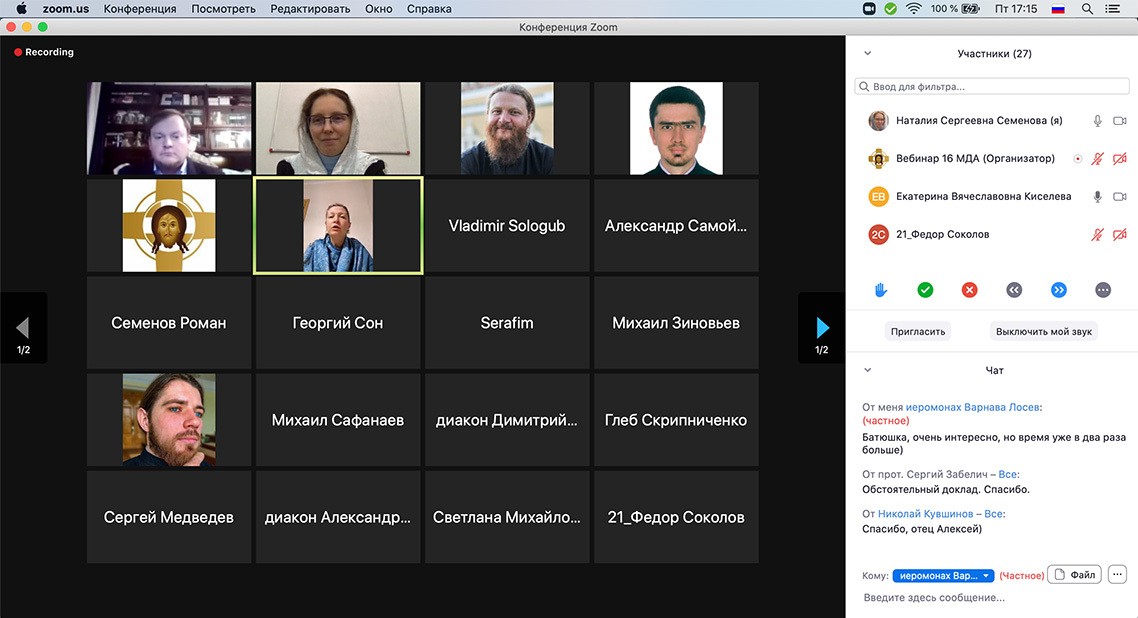
At the meeting the following speakers presented their reports:
- Archpriest Alexander Zadornov, PhD in Theology, Associate Professor of the Moscow Theological Academy. Intellectuals and Christianity in Europe: Enemies and Imaginary Allies. Intellectuals and Christianity in Europe: Enemies and Imaginary Allies.
- Hieromonk Varnava (Losev), Senior lecturer of the Department of Church Practical Disciplines, MThA. Minority rights v. majority rights in the context of discrimination against Christians. Права меньшинства v. прав большинства в контексте дискриминации христиан.
- N.S. Semenova, PhD in Legal Sciences, Associate Professor of the Department of Church Practical Disciplines of the MThA. Realizing the right to freedom of conscience during a pandemic. Реализация права на свободу совести во время пандемии.
- A.M. Solntsev, PhD in Legal Sciences, Associate Professor, Deputy Head of the Department of International Law of the Law Institute (RUDN). Turkey's actions to open a mosque in the Hagia Sophia museum as a violation of international law.
- Диакон Алексий Арефьев, студент 2 курса магистратуры МДА, профиль «Пасторология и литургика». Deacon Alexy Arefiev, 2nd year student of the Moscow Academy of Sciences, specializing in Pastorology and Liturgy. The Situation of Christians in Pakistan.
- Sergey Pimenov, postgraduate student of the Department of Church Practical Disciplines of the Moscow Theological Academy. The Legal Status of the Christians in the Middle East.
- E.V. Kiseleva, PhD in Legal Sciences, Associate Professor of the Department of International Law of the Law Institute (RUDN). Conscientious objection to abortion: comparative international legal framework.
All reports caused a lively discussion among the participants. The materials will be published in the next issue of "Praxis", the scientific journal of the Moscow Theological Academy.
The MThA Department of Theology organised the work of two sections. The following participants presented their reports in the first one:
- Archpriest Pavel Velikanov, Associate Professor of the MThA. Psychology in the Anglican Church: An Experience of Interaction.
- Hegumen Adrian (Pashin), Associate Professor of the MThA. Dogmatic theology: form and content.
- Priest Pavel Lizgunov, Associate Professor of the MThA. The doctrine of eldership in the Byzantine and Russian tradition.
- Priest Stefan Domusci, Associate Professor of the MThA. Moral aspects of the Sacrament of Confirmation in the light of the patristic teaching on the gifts of the Holy Spirit.
- A.M. Gaginsky, PhD in Philosophy, Senior lecturer of the MThA. Transcendentalia entis as an actual philosophical and theological project.
- Priest Anthony Borisov, Associate Professor of the MThA. The via media principle as an attempt at self-identification of Anglicanism in the writings of Richard Hooker (1554-1600).
- Anatoly Parpara, PhD in Medical Sciences, MThA Assistant. Personality and Society in the Christian Philosophy of Archpriest Vasily Zenkovsky.
Associate Professor P.K. Dobrotsvetov, Associate Professor R.M. Kon’, Associate Professor Deacon Sergius Panteleev, Priest Dimitri Artemkin, Priest Anatoly Lipatov, Hieromonk Damian (Voronov) presented their reports on patrology, sectology and natural science apologetics.

Associate Professor P.K. Dobrotsvetov revealed the doctrine of the Antichrist in the writings of Blessed Augustine. Associate Professor R.M. Kon’ presented his report on peculiarities of the Christology in Baptism. Associate Professor Deacon Sergius Panteleev highlighted a problem of the sacraments' secrecy (according to St. Ambrose of Mediolan) in the contemporary state of the information technologies development. Priest Dimitri Artemkin talked about aspects of the "canon" concept in the pre-Nicene church writing. Priest Anatoly Lipatov examined the question of the ecclesiological and sacramentological aspects in St. Cyril of Alexandria’s soteriology. Hieromonk Damian (Voronov) gave an ethical assessment of biohacking as a trans-humanistic project to “improve” a person.
The Department of Philology presented five reports dedicated to the analysis and comprehension of a number of Greek, Slavic and Russian texts. Professor V.M. Kirillin, Doctor of Philology, Head of the Department of Philology presented his report on two homiletic compilation texts in honour of the Holy Equal-to-the-Apostles Prince Vladimir ("Praise" and "Instructions" to Prince Vladimir) created at the beginning of the 16th century. Professor Hegumen Dionisy (Shlenov), PhD in Theology, told about Monk Nikita Stifatus’s teaching of the fear of God in the context of the previous patristic tradition.

D.V. Makarov, Doctor of Culturology, PhD in Philology, Associate Professor of the Department of Philology at the Moscow Theological Academy, gave the interpretation of light images in "The Sun of the Dead" by I.S. Shmelev. Priest Mikhail Zheltov, PhD in Theology, Lecturer of the Department of Philology, acquainted the audience with the results of his research on the manuscript tradition and textology of the liturgical commentary "Church-mystagogical history" ("Church Legends"), which was previously attributed to St. German of Constantinople.

Deacon Dimitri Bolychev, Lecturer of the Department of Philology, examined the teaching of the Bishop of Kyziches Eunomius and his correspondence with the Cappadocian fathers’ way of thinking about connections between an object and a name.
Lecturers of the Department of History and Theory of Church Art covered a wide range of topics and presented the results of scientific researches on monumental fresco painting, decorative art, hagiographic multi-plot compositions, iconography of twelve holidays and evangelical images in the works of the 19th century Russian artists.

The participants discussed reports on the form of icons, crosses, shrouds and various churches and monasteries established by Tsar Feodor Ioannovich and his wife, the Stroganov dynasty and Emperor Alexander II. The topics caused lively response from the audience. All materials will be published in the next issue of "Herald of Church Art and Archeology" journal.
The section "Biblical and Theological Heritage of Blessed Jerome of Stridon", which was dedicated to the 1600th anniversary of his death, moderated by Archpriest Alexander Timofeev, Head of the MThA Biblical Cabinet, took part within the framework of the Intercession Conference.
The following reports were presented by
⦁ Archpriest Alexander Timofeev, Head of the MThA Bible cabinet and Senior lecturer. The Exegetic Works of Blessed Jerome of Stridon as a Source for Biblical Archeology and Geography.
⦁ Deacon Nikolai Shablevsky, PhD in Theology, Senior lecturer of the MThA. Features of the interpretation of the blessed Jerome of Stridon the Aramaic verses of the Book of Daniel.
⦁ Deacon Sergiy Kozhukhov, Associate Professor, PhD in Theology. Method and exegesis of Blessed Jerome in Commentary on the Gospel of Matthew.
⦁ P.A. Korotkov, Senior lecturer of the MThA. Features of the exegetical heritage of the blessed Jerome of Stridon: interpretation of the Epistle of St. Paul to the Galatians.
⦁ Petr Trofimov, 4th year student of the MThA. Spiritual understanding (intelligentia spiritualis) of Holy Scripture according to Blessed Jerome: teaching about the limits of the application of the method in the text "Homilius to the Gospel of Mark".
Archpriest Rostislav Snigirev, Professor, Head of the Department of Biblical studies of the Kiev Theological Academy, participated in the following discussion on historical, allegorical and anagogical methods of the Holy Scripture exegesis. In conclusion, Archpriest Alexander Timofeev thanked the participants and invited everyone to take part in the conference "Blessed Jerome - Teacher of the East and West", which is scheduled for December 7-8 at the Russian Humanitarian Social University.
Also, the Department of Biblical Studies organized two sections dedicated to exegesis and hermeneutics of the Holy Scriptures. Section 1 included the following reports:
- Archpriest Georgy Klimov, PhD in Theology, Head of the Department of Biblical Studies at the MThA. Comparative significance of Christian virginity and marriage according to the teachings of the Apostle Paul in the works of the Ante-Nicene Fathers.
- M.V. Kovshov, PhD in Theology, Associate Professor. The greatness of the eschatological Mediator-Messiah as a condition for the effectiveness of his ministry according to Hebrews.
- Archpriest Oleg Mumrikov, PhD. in Theology, Associate Professor. Critical analysis of the anthropological concept of Yu.N. Harari from the point of view of the biblical paradigm.
- Priest Alexy Sergeev, PhD in Theology, Senior lecturer of Saint-Petersburg Theological Academy. "Kenosis of the Logos" (Phil. 2: 6–11) according to the interpretation of the Monk Justin (Popovich) on the Epistle to the Philippians of St. Paul the Apostle (translation from Serbian and commentary in the light of modern Western exegesis).
- Priest Alexy Sergeev, PhD in Theology, Senior lecturer at the Department of Biblical Studies of Saint-Petersburg Theological Academy. "Questions of the Gospel" by Blessed Augustine of Hippon: history of translation, especially exegesis and theology.
- Priest Dionysius Kharin, Teacher of Saint-Petersburg Theological Academy. The influence of the apostle Paul on the theological views of the apostle Luke.
Вторая секция состоялась накануне, 15 октября. В ней приняли участие не только официальные докладчики, но и многие члены профессорско-преподавательской корпорации кафедры библеистики МДА, Киевской духовной академии, а также студенты-магистранты и аспиранты библейского профиля. В соответствии с заявленной программой были заслушаны следующие сообщения.
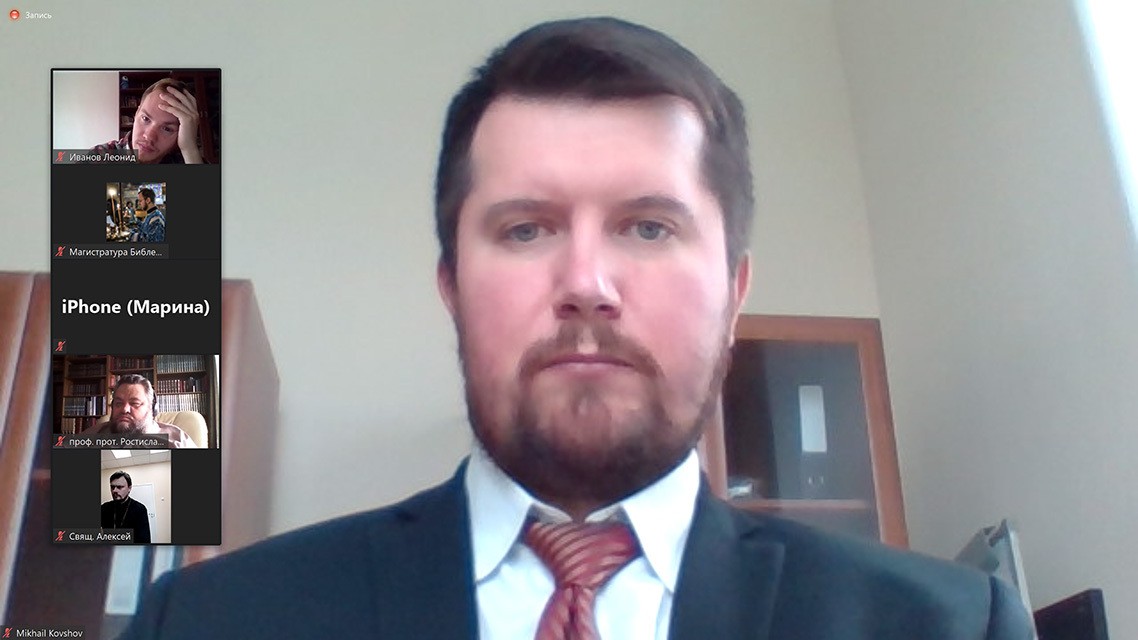
The second section took place on October 15th.
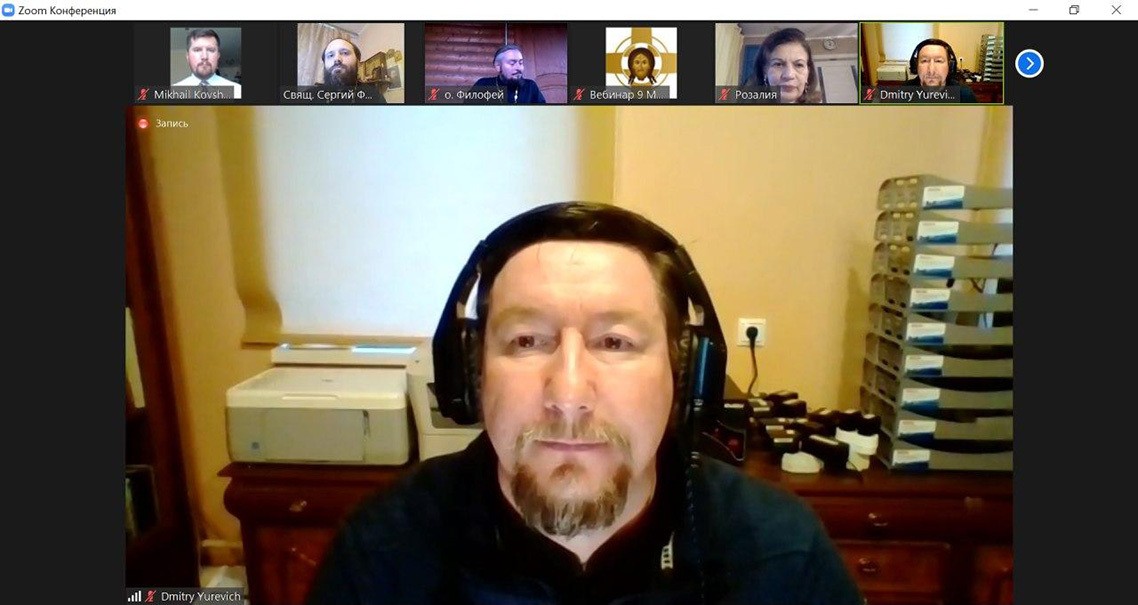
В результате раскопок 1990–2014 гг., проводившихся под руководством Амнона Бен-Тора, удалось подтвердить датировку строительства еврейского города X в. до Р.Х. Вкупе с недавними раскопками в Хирбет Кейафе это позволяет утверждать, что имеются серьезные археологические аргументы в пользу существования мощного израильского царства в эпоху Соломона.
It was attended by many members of the teaching corporation of the Department of Biblical Studies of the Moscow Theological Academy, the Kiev Theological Academy, as well as undergraduate and graduate students.
1. Еврейская библейская традиция более точно, чем славянские переводы, отслеживает присутствие колен Израилевых в мистерии Нового Иерусалима.
2. Текст Священного Писания отражает исторические изменения названий многих камней, или перенос названий с одних минералов на другие Этот вывод может быть полезен не только для библейской экзегезы, но, возможно, и для истории минералогии и естествознания в целом, открывает перспективу историко-культурологических исследований.
В своем докладе доктор филологических наук, профессор МДА, главный палеограф Отдела рукописей Российской государственной библиотеки М.С. Крутова рассказала о судьбе уникальных 13 славяно-русских Евангелий из Ризницы Троице-Сергиевой Лавры: преподобного Никона Радонежского, Симеона Гордого, Богдана Хитрово, боярина Феодора Кошки, Исаака Бирёва и др. Это — Евангелия-тетры или апракосы. В ходе яркой и красочной презентации, сопровождавшей доклад, каждое Евангелие было кратко охарактеризовано и снабжено палеографическим описанием, при этом особое внимание обращалось на художественные и текстологические особенности каждого из памятников искусства. Итогом проведенного искусствоведческого — исторического, палеографического и текстологического — анализа стало заключение: книга могла быть определена на хранение в Ризницу, если удовлетворяла одному из следующих критериев: древность, особенное содержание, высокая художественная значимость, большая известность и именитость владельца книги.
Иеромонах Филофей (Артюшин), доктор теологии, доцент МДА, выступил с докладом на тему «Идейное своеобразие толкований блаженного Августина на избранные евангельские притчи». На основании экзегетического анализа одной из проповедей святого (Sermo 111), была реконструирована историческая ситуация и богословский контекст употребления латинским автором таких евангельских притч, как: притча о закваске (Лк. 13:21–23), о горчичном зерне (Лк. 13:19), о сеятеле (ср. Ин. 12:24), о пшенице и плевелах (Мф. 13:30). В результате проведенного исследования было установлено, что блаженный Августин как толкователь Священного Писания следует в русле современной и предшествовавшей ему экзегетической традиции, но наполняет общеизвестные сравнения, метафоры и аллегории новым, по преимуществу, полемическим смыслом и пафосом. В полемике с донатистами образ Церкви как Тела Христова и плодородной нивы, в которой смешаны между собой пшеница (верные чада Церкви) и плевелы (еретики), становится для проповедника важнейшим орудием в защиту традиционного — подлинно библейского — учения: на примере герменевтики, экклезиологии и сакраментологии.
Работу секции завершило выступление монахини Александры (Мушкетовой), посвященное теме «Вифлеем, Рождество Христово. Новый взгляд из XXI в.». При анализе родословий Иисуса Христа у евангелистов Матфея и Луки обращает на себя внимание тот факт, что они не совпадают по именам предков, количеству и родоначальнику: 42 от Соломона и 77 от Нафана соответственно. С целью построения единой родословной Господа была предпринята попытка согласования евангелистов с помощью методики построения генеалогических схем, заимствованной из инженерной системотехники. Она обеспечила визуальную четкость и системность подхода к древней богословской проблеме. Изучение исторических сведений о родственных связях между членами семьи Иисуса Христа, апостолами и другими, более 50-ти, евангельскими персоналиями позволило разработать генеалогические схемы семей Спасителя, апостолов Петра, Павла и 4 евангелистов в пакете из 16 схем.
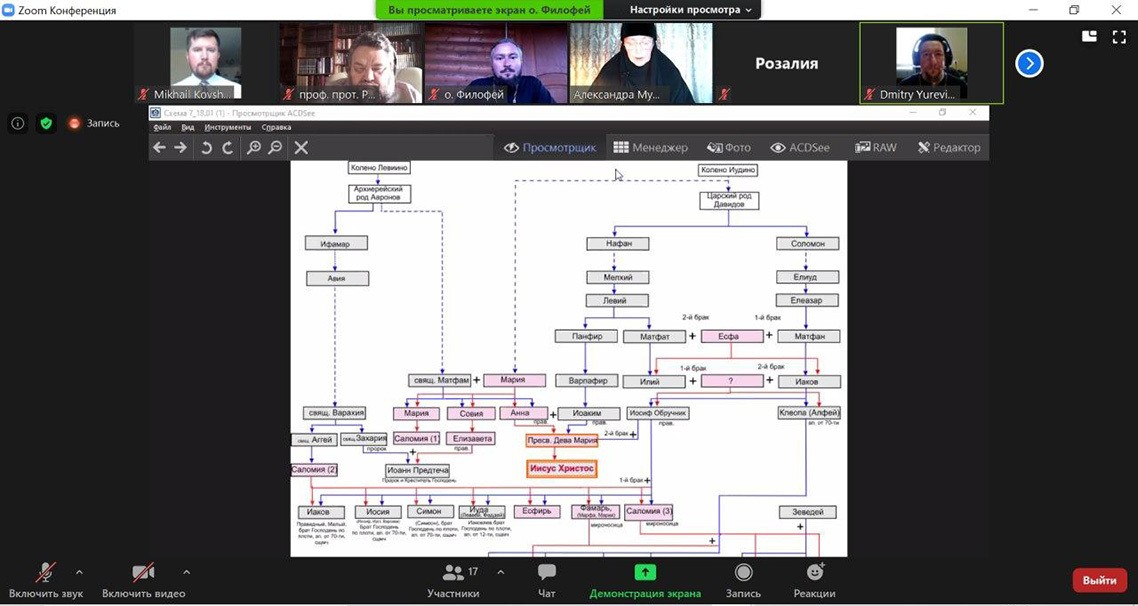
Исследование привело к выводу, что оба родословия по Матфею и Луке не только не противоречат, но гармонично дополняют друг друга. Вместо абстрактного представления взаимосвязи событий I в. от Рождества Христова в Вифлееме, вырванного из контекста истории; наглядное раскрытие родственных взаимосвязей в генеалогических и генетических схемах вносит ясность и открывает новые возможности в изучении и понимании Священного Писания. Этот инструмент исследования может служить ключом для понимания исторических событий I века. По итогам секционной работы планируется публикация прочитанных докладов в сборнике трудов кафедры библеистики МДА.
В работе секции «История Церкви» приняли участие преподаватели кафедры церковной истории, аспиранты и студенты исторического отделения магистратуры. Доцент иерей Иоанн Кечкин рассказал о годах учебы и ректорства в МДА митрополита Филарета (Вахромеева).
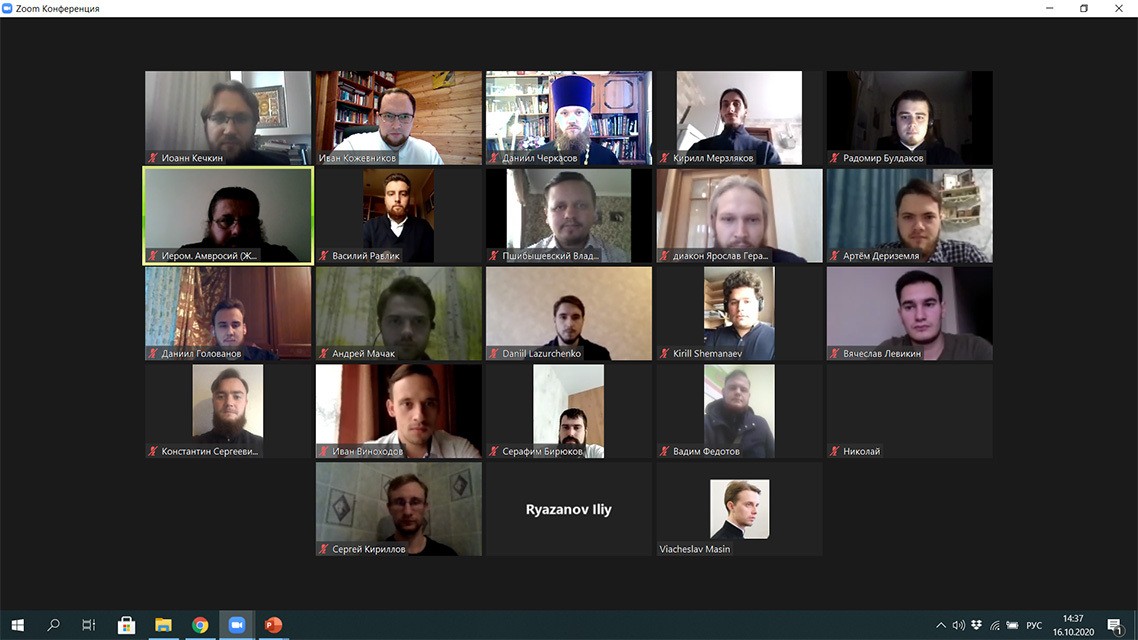
Аспиранты Радомир Булдаков и Владислав Пшибышевский анализировали пожелания региональных церковных съездов по реформированию Церкви в 1917 г. и мнения епархиальных архиереев по вопросу состава участников Поместного Собора. Проблематике контактов с Англиканской церковью в контексте Поместного Собора 1917–1918 гг. был посвящен доклад иеромонаха Амвросия (Желябовского). Об участии профессора МДА Н.Ф. Каптерева в полемике о социальной деятельности монашества рассказал диакон Вячеслав Масин. Студенты церковно-исторического отделения магистратуры А. Дериземля, И. Виноходов, А. Мачак и Д. Голованов в своих выступлениях затронули темы: значения приходов в деле церковной благотворительности, борьбы с обновленчеством в Рязанской епархии, освещения греко-болгарской распри в отечественной историографии и преследования архиереев при императрице Анне Иоанновне.
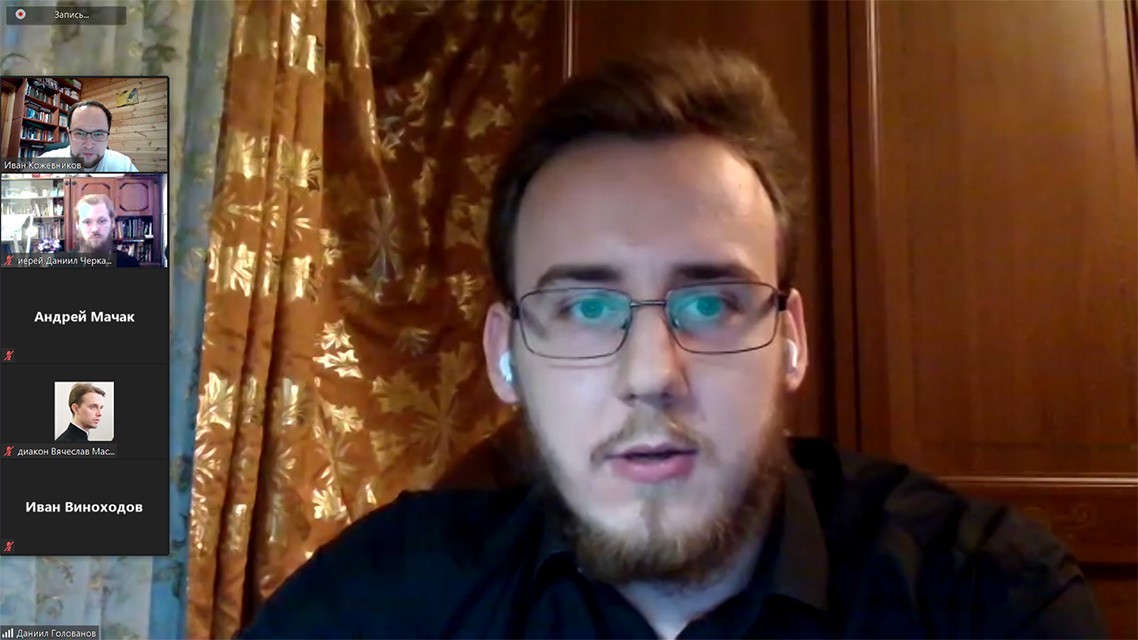
Студент магистратуры иерей Даниил Черкасов выступил с повествованием об активном религиозном деятеле и публицисте, семинарском однокласснике Иосифа Джугашвили Ионе Брихничеве. Многие доклады вызвали интерес и живой диалог участников.
Организаторы конференции благодарят Информационно-технический отдел МДА за обеспечение бесперебойной работы всех секций Покровской конференции.
MThA Press Office
